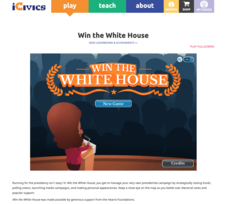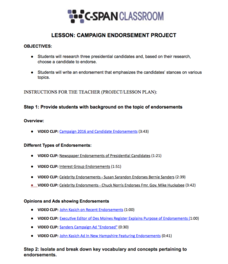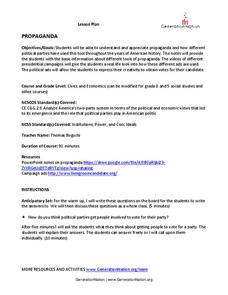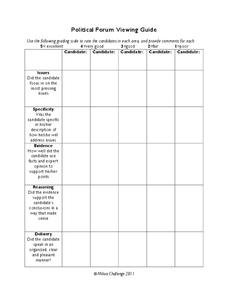Encyclopedia Britannica
Political Issue Timeline
As part of a study of US Presidential elections, class members track the history of an issue in the 2020 campaign. They create a timeline to determine if there are any patterns, if ideas about the issue have evolved, or if in issue is no...
Encyclopedia Britannica
Election Issue Comparison Chart
As part of a study of the issues raised in the 2020 presidential election campaign, class members investigate and then create a pro-con comparison chart that reveals each candidate's position on a variety of issues.
Encyclopedia Britannica
Candidate Position History Research
Climate change. Assault weapons ban. Death penalty. And the list goes on. So many issues are part of a US presidential election that it can be hard to determine a candidate's position on a particular topic and whether their position has...
Encyclopedia Britannica
Presidential Qualifications
Can anyone grow up to be president of the United States? As part of their study of the 2020 election, groups research the constitutional requirements to become president. The class then brainstorms a list of qualifications beyond those...
Encyclopedia Britannica
Do the Campaign Math
Follow the money trail! As part of their study of the 2020 Presidential campaign, class members to research how much money candidates have raise and spent, as well as the sources of the funds. They then graph their findings to compare...
Encyclopedia Britannica
Candidate Position Research
As part of their study of the US Presidential election process, class members research a presidential candidate's position on a specific topic or topics. Formatting their research as a pro/con question ("Should the Death Penalty Be...
Encyclopedia Britannica
Candidate Flip-Flop or Evolution?
Beware political rhetoric! Connotation is everything! Groups select a presidential candidate and investigate how the candidate's position has changed on a specific issue. After analyzing the situation, the group determines whether they...
Encyclopedia Britannica
Candidate Book Report
After reading candidate biographies, class members select one candidate to research. They craft a report on the candidate's book, their position on issues, and the image the candidate wants to project.
Encyclopedia Britannica
Campaign Photo Analysis
It's the art of the image! As part of a study of the 2020 Presidential race, groups analyze an image of a candidate, first from an objective point of view and then subjectively. They then prepare a presentation detailing what they...
Constitutional Rights Foundation
Elections, Money, and the First Amendment
Those who spend the most, win. Academics read informational text, participate in group discussion, and defend campaign reforms to understand the correlation between money, the First Amendment, and election results. The resource explains...
Smithsonian Institution
The American Presidency: Grades 4-6
An interesting unit explains the American presidency from the campaign trail all the way to the role of the president. Historians participate in discussions, create posters, conduct Internet research, and more to gain an understanding of...
iCivics
Win the White House
What does it take to win the White House? A video game allows young political operatives to try their hand at winning 1600 Pennsylvania Avenue by deciding on key issues, where and how to spend campaign dollars, and the role of polling...
C-SPAN
Campaign Endorsement Project
So many politicians, so many endorsements! Learn to differentiate between facts as well as the process of endorsements with an informative resource. Class members watch current endorsement videos, research candidates from three different...
C-SPAN
Student Symposium and Resulting Action
Your class may not be able to vote yet, but that doesn't mean they can't feel like they're part of the presidential election! The resource creates a symposium where pupils debate about a selected topic in current events during an...
University of Wisconsin
Analyzing Presidential Campaign Propaganda
Campaign propaganda has evolved from 1952 through the presidential election of 2008. A social studies activity prompts class members to analyze the devices used in ads and political cartoons, noting strategies they believe would work to...
Brown University
The Candidates and Their Values: Election 2016
Voting for the next president of the United States is about finding the candidate who most closely aligns with your own values and sense of democracy. High schoolers become acquainted with the candidates from the 2016 election with a...
Mikva Challenge
Deconstructing Campaign Messages and Perceptions
Target audience, covert message, explicit and implicit appeals. As part of an investigation of rhetorical devices used in campaign ads, class members examine and deconstruct the appeals in logos from the 2008 election. They then use the...
C-SPAN
Presidential Candidate Research
Don't let the young citizens in your social studies class get all their election information from inflammatory commercials and arguing pundits. Use a lesson plan from C-SPAN to guide class members through an election season with a...
Generation Nation
Propaganda
How does propaganda influence our vote? Through grand conversation, scholars gain information about what is and how to identify the different ways propaganda is used in a presidential election. Using their new-found knowledge, citizens...
C-SPAN
Polling and Public Opinion
Most people are eager to offer their opinions about topics of interest, but what's the most effective way to collect and assess these opinions as a matter of fact? High schoolers learn about the history of polling, as well as the...
Brown University
Following the U.S. Presidential Election
Election years provide the opportunity to evaluate news media as well as the next prospective president. High schoolers read about the same event in several different news sources, varying in type, origin, and political leaning, before...
Mikva Challenge
Political Forum Viewing Guide
Is there a way to determine a winner of a political debate? Use a helpful rubric to evaluate the issues, specificity, evidence, reasoning, and delivery of candidates in a debate. After assessing each person's performance, high schoolers...
Museum of the Moving Image
AdMaker, Obama vs. McCain, “Fundamentals” (2008)
Truth is often left on the cutting room floor when political ads are produced. After viewing the 2012 backfire ad, "Fundamentals" that takes John McCain's comments on the US economy out of context, class groups edit the audio and video...
Museum of the Moving Image
AdMaker, Nixon vs. Humphrey, “Convention” (1968)
After viewing the infamous 1968 Presidential campaign ad, "Convention," groups use AdMaker to create their own 30 second ad that features Richard Nixon rather than Hubert Humphrey.

























